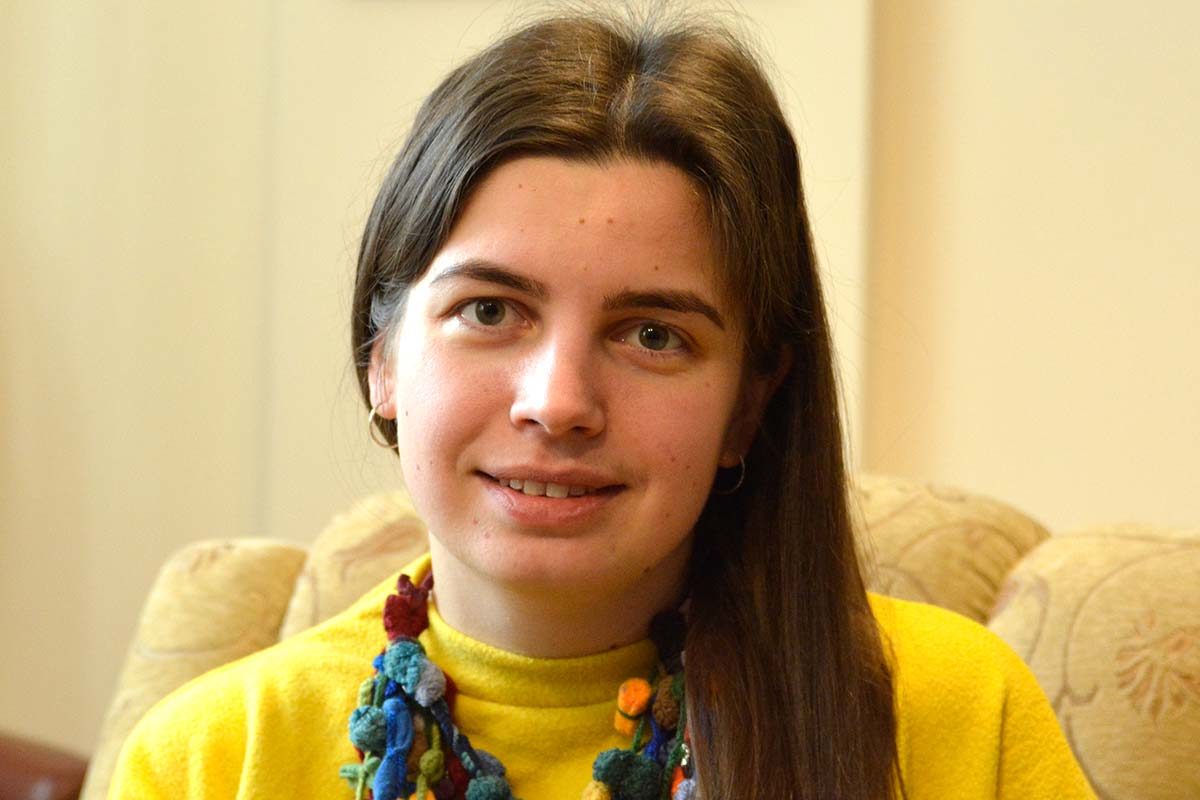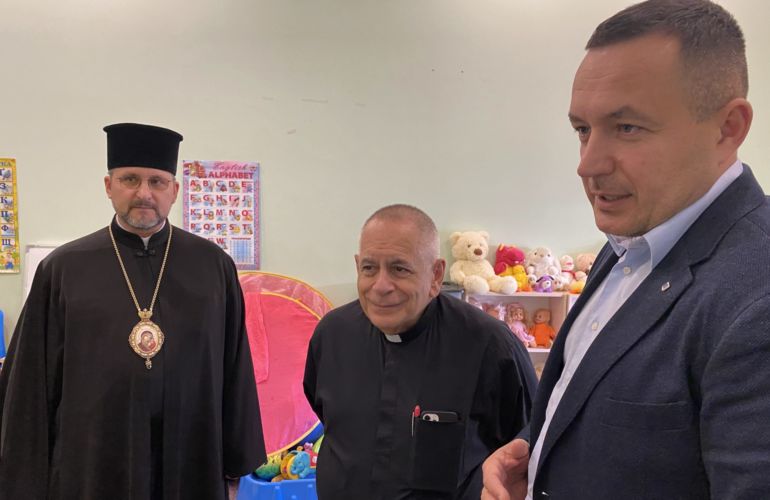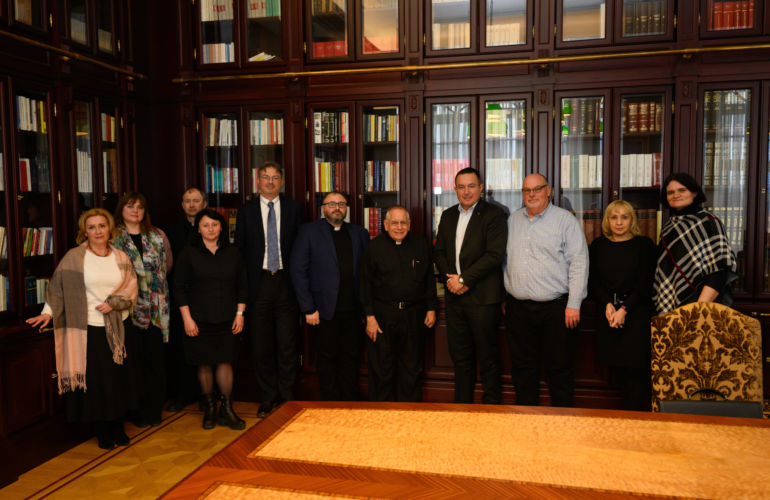ICMC’s New Partnerships Provide Spiritual and Psychological Support for People Affected by the War in Ukraine
In the following interview, Ukrainian psychologist and expert trainer Maria Trakalo discusses cooperation between priests and psychologists to facilitate healing for people facing war trauma. Trakalo leads ICMC’s workshops for seminarians (preparing for ordination to the Catholic priesthood) in Ukraine, teaching them to identify and respond to signs of trauma and to work with mental health experts to provide holistic assistance to people in need. The training is part of ICMC’s Ukraine programs.

In her May 2022 address to the 75th World Health Assembly, First Lady of Ukraine Olena Zelenska highlighted the severe psychological impacts of the conflict in Ukraine, which began with the Russian invasion of 24 February. “Ukraine will be rebuilt,” she said. “But the consequences of this war will unfortunately remain for years and decades. So,one more task is the battle for the mental health of our people.”
Ten months later, the World Health Organization (WHO) estimates that approximately ten million Ukrainians are at risk of mental health difficulties. While the greatest needs are in parts of the country most severely impacted by the war, relatively safer areas are also affected.
ICMC is addressing the psychological needs of those affected by the war in Ukraine as part of its work as a founding member of the Catholic Response for Ukraine Working Group*. Priests working with affected populations may sometimes need to involve psychologists and other mental health professionals, in addition to the spiritual assistance they provide. Therefore, ICMC’s projects in Ukraine include the training of seminarians of both the Roman Catholic and Greek Catholic Churches to teach them to recognize and react to signs of war trauma.
The training sessions are conducted in collaboration with the Mental Health Hub DiyaTy**, an initiative by the St. Nicholas House of Mercy in Lviv. The Hub brings together priests and expert psychological professionals to create a Church-inspired response to the new mental health challenges created by the war.
Our guest interviewee is one of the program’s trainers, Ms. Maria Trakalo, a Gestalt psychologist and head of the Mental Health Hub. We discussed the cooperation between priests and psychologists and their respective roles in facilitating healing for people traumatized by war.
What has been the reaction of local populations to the Mental Health Hub project you are leading?
MT: Many people approach us because they trust us, not least because they know that we understand both the spiritual and psychological aspects of their needs and situations and respect their Christian values. While the idea of taking care of one’s mental health was less widespread in Ukraine than elsewhere, the war has really shown people how crucial it is.
The Hub was launched on 1 June 2022, and demand for its services it was immediately high. While we have gained experience through the Hub’s success, the number of requests we receive proves the urgency of providing mental health services in Ukraine.
You’re involved in the ICMC project to train seminarists of both the Greek Catholic and Roman Catholic Rites. Could you tell us about this initiative?
MT: The training focuses on psychological assistance and spiritual support during war. Its main goal is to explain psychological trauma and mental health functioning, and the link to spirituality. Priests are approached by many people who trust them, and they need an understanding of psychosocial assistance so they can provide help.
So far, we have held training sessions in two Greek Catholic seminaries in the cities of Ivano-Frankivsk and Drohobych, as well as for seminarians of the Roman Catholic seminary in Bryukhovychy. The next planned sessions will be with seminarians in Ternopil and Kyiv. The training focuses on seminarians because they are preparing for future ministry, and therefore there is time to ensure they are thoroughly trained.
What are the main elements you cover during the training?
MT: We talk about the psychological manifestations of trauma during war, and about the need to take care of oneself in order to be able to help others. We also explore the notion of psychological trauma and its signs and symptoms, including how to recognize trauma in oneself and others, and the tools we need so we are prepared to assist.
We explain that humans consist of spirit, soul, and body, that psychological trauma has harmful impact on all three, and that we need to treat people holistically. I emphasize that we must learn to provide care as a team, because we will need a priest, a psychotherapist, a psychiatrist, or other healthcare professionals. It won’t suffice to only treat wounds: it is also necessary to help people overcome post-traumatic stress disorder and rediscover their sense of purpose to give them the impetus to live on.
How have priests reacted to the idea of working alongside mental health professionals to assist their parishioners?
Chaplains who work with young people or orphans have noticed that not all problems can be addressed only through prayer. They realize that proper care means giving help based on an individual’s needs, not on their own wishes or habits. It is not enough to only console a person with some general phrase, or to only treat their symptoms. It is worth mentioning that psychotherapists also often refer people to clergymen when we detect that a person’s problem stems from the spiritual area.
___
The training of seminarians on psychological trauma caused by war was implemented in partnership with the Lviv Greek Catholic Seminary of the Holy Spirit. It is supported by the GHR Foundation. To learn more about ICMC’s projects in Ukraine, visit ICMC’s Ukraine landing page.
* The Catholic Response for Ukraine Working Group (CR4U) is a partnership of Catholic organizations working together to share information about humanitarian responses, by Catholic-inspired organizations, to the needs created by the war in Ukraine.
** The Mental Health Hub DiyaTy was created by the St. Nicholas House of Mercy in Lviv in June 2022. It is a collaboration between the Student Chaplaincy Center, Orphan Care Center, and Ukrainian Education Platform.

Vita Yakubovska
Vita Yakubovska is a Ukrainian journalist.



